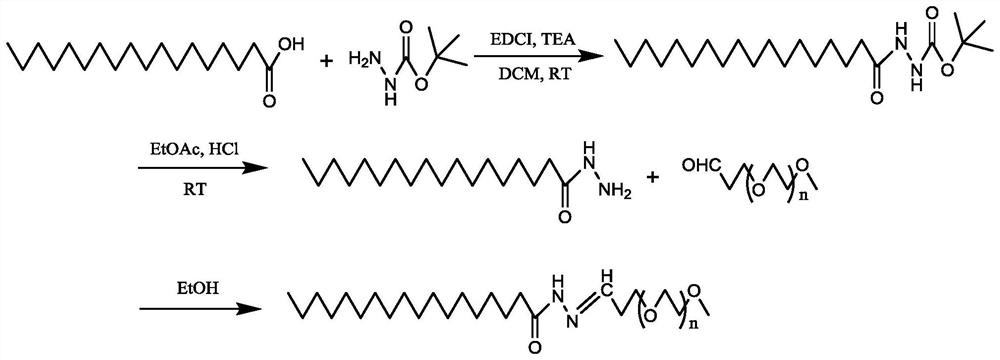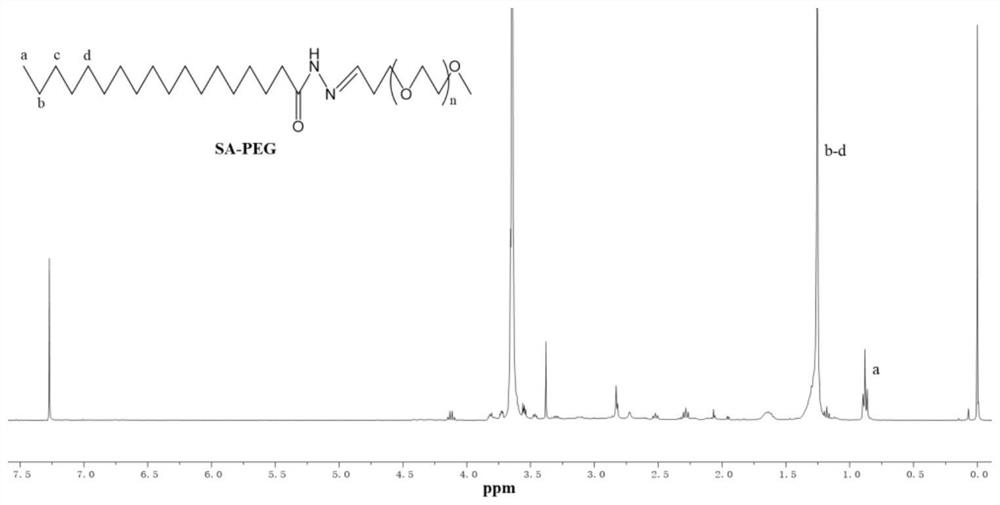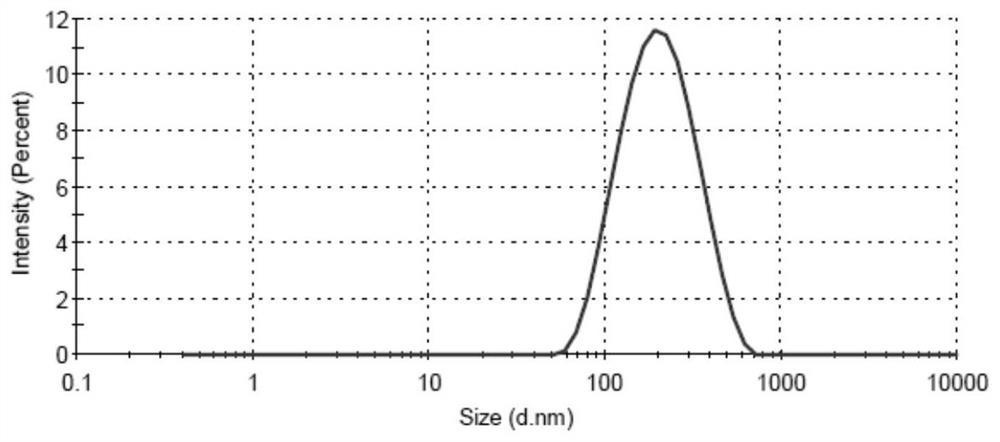An oral nanoparticle for penetrating gastrointestinal mucus and epithelial cell barrier and its preparation method and application
An epithelial cell and nanoparticle technology, applied in non-active ingredients medical preparations, medical preparations containing active ingredients, pharmaceutical formulas, etc., can solve the problem of weakening the affinity between nanocarriers and cell membranes, the effect is not satisfactory, and the real Solve problems such as effective drug delivery
- Summary
- Abstract
- Description
- Claims
- Application Information
AI Technical Summary
Problems solved by technology
Method used
Image
Examples
Embodiment 1
[0041] A preparation method of oral nanoparticles for penetrating gastrointestinal mucus and epithelial cell barrier, characterized in that, comprising the following steps:
[0042] (1) Preparation of pH-responsive materials, the synthesis process is as follows figure 1 shown:
[0043] A: Dissolve 2.50 g of stearic acid (SA) in 100 ml of dichloromethane (DCM), add 1-(3-dimethylaminopropyl)-3-ethylcarbodiimide hydrochloride to the above solution (EDCI) 2.02g, triethylamine (TEA) 1ml and tert-butyl carbazate (boc-hydrazide) 1.39g, reacted at room temperature for 12h, after the reaction, washed with water 3 times, then washed with saturated brine 3 times, It was then dried over anhydrous sodium sulfate, filtered, and the solvent was removed in vacuo to obtain 2.77 g of BOC-protected hydrazide SA;
[0044] B: Dissolve 1 g of BOC-protected hydrazide SA in 20 mL of ethyl acetate, add 2 drops of hydrochloric acid dropwise to the above solution, and react at room temperature for 2 h...
Embodiment 2
[0049] A preparation method of oral nanoparticles for penetrating gastrointestinal mucus and epithelial cell barrier, characterized in that, comprising the following steps:
[0050] (1) Preparation of pH-responsive materials:
[0051] A: Dissolve 1.10 g of stearic acid (SA) in 30 mL of dichloromethane (DCM), and add 1-(3-dimethylaminopropyl)-3-ethylcarbodiimide hydrochloride to the above solution (EDCI) 1.48g, triethylamine (TEA) 0.2mL and tert-butyl carbazate (boc-hydrazide) 0.61g, react at room temperature for 20h, after the reaction, wash with water 3 times, then with saturated brine 3 times , then dried over anhydrous sodium sulfate, filtered, and the solvent was removed in vacuo to obtain 1.31 g of BOC-protected hydrazide SA;
[0052] B: Dissolve 0.50 g of BOC-protected hydrazide SA in 15 mL of ethyl acetate, add 3 drops of hydrochloric acid dropwise to the above solution, and react at room temperature for 4 h. After the reaction, the product is washed with deionized wat...
Embodiment 3
[0057] A preparation method of oral nanoparticles for penetrating gastrointestinal mucus and epithelial cell barrier, characterized in that, comprising the following steps:
[0058] (1) Preparation of pH-responsive materials:
[0059] A: 1.50 g of stearic acid (SA) was dissolved in 20 mL of dichloromethane (DCM), and 1-(3-dimethylaminopropyl)-3-ethylcarbodiimide hydrochloride was added to the above solution (EDCI) 1.72g, triethylamine (TEA) 0.2mL and tert-butyl carbazate (boc-hydrazide) 1.04g, react at room temperature for 24h, after the reaction, wash with water 3 times, then with saturated brine 3 times , then dried over anhydrous sodium sulfate, filtered, and the solvent was removed in vacuo to obtain 1.76 g of BOC-protected hydrazide SA;
[0060] B: Dissolve 0.50 g of BOC-protected hydrazide SA in 20 mL of ethyl acetate, add 3 drops of hydrochloric acid dropwise to the above solution, and react at room temperature for 6 h. After the reaction, the product is washed with de...
PUM
| Property | Measurement | Unit |
|---|---|---|
| molecular weight | aaaaa | aaaaa |
| molecular weight | aaaaa | aaaaa |
| particle diameter | aaaaa | aaaaa |
Abstract
Description
Claims
Application Information
 Login to View More
Login to View More - R&D
- Intellectual Property
- Life Sciences
- Materials
- Tech Scout
- Unparalleled Data Quality
- Higher Quality Content
- 60% Fewer Hallucinations
Browse by: Latest US Patents, China's latest patents, Technical Efficacy Thesaurus, Application Domain, Technology Topic, Popular Technical Reports.
© 2025 PatSnap. All rights reserved.Legal|Privacy policy|Modern Slavery Act Transparency Statement|Sitemap|About US| Contact US: help@patsnap.com



